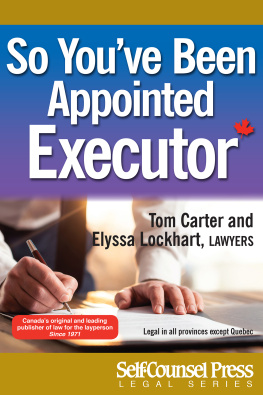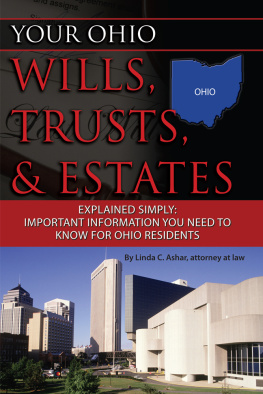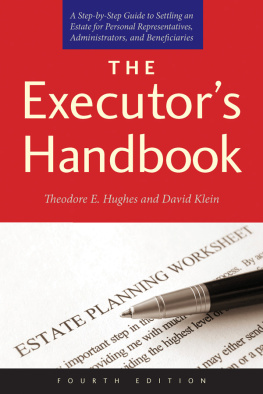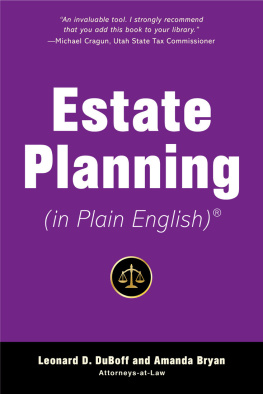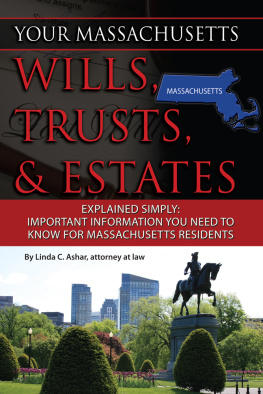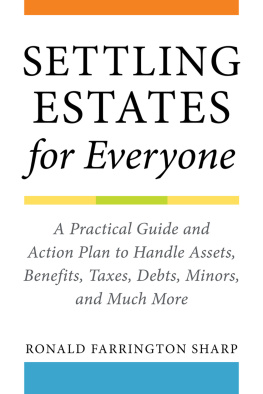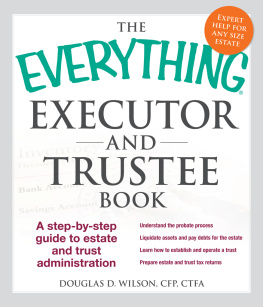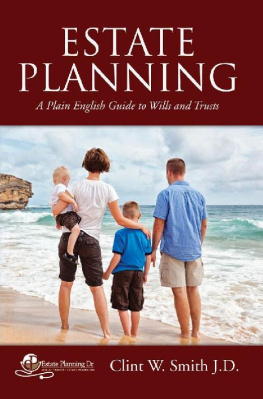The Essential
EXECUTORS
HANDBOOK
Everything You Need to Know to Settle an Estate
The Essential
EXECUTORS
HANDBOOK
A Q UICK AND H ANDY R ESOURCE FOR
D EALING W ITH W ILLS , T RUSTS ,
B ENEFITS, AND P ROBATE
DAVID G. HOFFMAN
Attorney at Law
Copyright 2016 by David G. Hoffman
All rights reserved under the Pan-American and International Copyright Conventions. This book may not be reproduced, in whole or in part, in any form or by any means electronic or mechanical, including photocopying, recording, or by any information storage and retrieval system now known or hereafter invented, without written permission from the publisher, The Career Press.
T HE E SSENTIAL E XECUTORS H ANDBOOK
E DITED BY P ATRICIA K OT
T YPESET BY K ARA K UMPEL
Cover design by Jeff Piasky
Cover icons by Palsur/shutterstock
Printed in the U.S.A.
To order this title, please call toll-free 1-800-CAREER-1 (NJ and Canada: 201-848-0310) to order using VISA or MasterCard, or for further information on books from Career Press.

The Career Press, Inc.
12 Parish Drive
Wayne, NJ 07470
www.careerpress.com
Library of Congress Cataloging-in-Publication Data
Names: Hoffman, David G.. author.Title: The essential executor's handbook : a quick and handy resource for dealing with wills, trusts, benefits, and probate / by David G. Hoffman, JDDescription: Wayne, NJ : The Career Press, Inc. 2016. | Includes bibliographical references and index.Identifiers: LCCN 2016001888 (print) | LCCN 2016002142 (ebook) | ISBN 9781632650313 (paperback) | ISBN 9781632659675 (ebook)Subjects: LCSH: Probate law and practice--United States--Popular works. | Executors and administrators--United States--Handbooks, manuals, etc. | BISAC: LAW / Wills. | LAW / Estates & Trusts.Classification: LCC KF765 .H64 2016 (print) | LCC KF765 (ebook) | DDC 346.7305--dc23LC record available at http://lccn.loc.gov/2016001888
For my smart, funny, loving,
and beautiful wife, Diane.
CONTENTS
INTRODUCTION
A s with any book, people will read this one for any number of reasons. But if you are reading it because you have lost a loved one, you have my most sincere condolences. I have worked with the dying, the wake they leave behind, and their grieving families for 35 years. In every case, somebody steps up to put things in orderwhat is generally referred to as settling the estate. If that someone is you, you are an exceptional individual. Most want no part of it (except for the money, of course) and are more than happy to leave the task to someone else. But, like anything you have never done before, you are probably anxious and overwhelmed. Those feelings are completely normal. Its your first day at school and you are rightly frightened. You neednt be.
Your job will carry many titles. You may be called the executor or the administrator or the trustee. Or you may be all of these. Whatever title you bear, your job is the same: to marshal and distribute.
The term marshalling refers to marshalling the assets of the decedent. That is to bring them together; to locate, account for, and organize every item the decedent owned; as well as to organize the debts. You will need to decide what to keep, what to sell, and what to abandon or send to the city dump. This can be a daunting task, but as my late father was fond of saying, just do it piecemeal. In short, this aspect of your job cannot be rushed. Your approach needs to be systematicone foot in front of the other. No skipping.
Distribution is usually what you would expect: distributing money to the beneficiaries of the estate. But it also entails paying the decedents debts (also known as disbursements). And all the while you are marshalling and distributing, the assets are most likely generating more assets in the form of income such as interest, dividends, and capital gains. And income is going to require income tax returns, both federal and state and sometimes many states.
If you didnt feel overwhelmed before, you probably do now. Not to worry. The point of this book is simple. Dont go it alone. And I am not merely referring to call a lawyer. The lawyer plays a big part in settling an estate, but you are going to need more than just a lawyer. Among others, you will most likely need an accountant, a realtor, a banker, a broker, an appraiser, an auctioneer, and a host of bureaucrats. If you dont have one already, may I also suggest a good bartendercheaper than a therapist and usually a lot more interesting.
The team approach is important for another reason. Even if you have never settled an estate before, the law treats you as an expert. So, if you make any serious mistakes, you, and you alone, are solely liable for whatever damage you do. By using a team of professionals, any mistakes will most likely be made by them and not you. You are still liable, but you will have a right to bring a claim against the person who is actually responsible.
You are probably wondering how long all of this is going to take. Unfortunately, in most cases, that is hard to estimate. I have, on rare occasion, helped an executor settle an estate in only six months. In other cases, the settlement process has dragged on for six or seven years. Every estate is different, and some that appear complex are not while those that appear to be easy at the outset become bogged down in problems you never saw coming. A large estate is not necessarily a difficult one, and small estates can be the worst. Accordingly, any prediction as to how long it will take to settle a particular estate is about as reliable as a weather forecast; probably somewhere in the ballpark or right about 80% of the time.
What follows is a more detailed description of your responsibilities and the people who are going to help you. You are going to learn some law, but just enough to help you understand why you are hiring these people and evaluate their performance. As I have said, all of the liability ultimately falls on you. Selecting the right team is as important as the work that they will do for you. There are times when you will be scared to death, lose sleep, and ask yourself why you ever took on this insane task. Dont fret about it. Just do it piecemeal.
Chapter 1
Meet Your Estates
T hats right. I said estates. The term, settling an estate is a misnomer. It is a colloquialism used to refer to the process of gathering up all of the decedents assets, from every source, paying off creditors, and then passing out whats left to heirs and beneficiaries. However, how this is actually accomplished varies depending on which estate you are attempting to settle. There are four estates: the Probate Estate, the Contract Estate, the Knick-Knack Estate, and the Trust Estate.
Now, my goal is to show you how to let others settle these estates for you, but you need to understand the basics because, as executor, you bear the bulk of the legal liability. You need to keep an eye on these people as the work proceeds.
The Probate Estate
The Probate Estate consists of assets that the decedent owned in the decedents name alone, without a joint owner, without a beneficiary, and without a living trust (more about living trusts later in this chapter). These assets are unique since, when you die, there is only one way to get at them and that is through the court proceeding known as probate.
Next page

